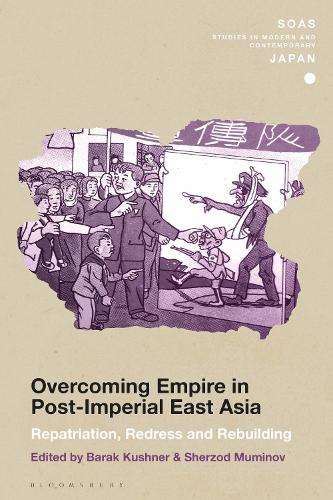
Overcoming Empire in Post-Imperial East Asia: Repatriation, Redress and Rebuilding
(Paperback)
Publishing Details
Overcoming Empire in Post-Imperial East Asia: Repatriation, Redress and Rebuilding
By (Author) Barak Kushner
Edited by Sherzod Muminov
Bloomsbury Publishing PLC
Bloomsbury Academic
17th June 2021
United Kingdom
Classifications
Tertiary Education
Non Fiction
950.42
Physical Properties
Paperback
240
Width 156mm, Height 234mm
372g
Description
When Emperor Hirohito announced defeat in a radio broadcast on 15th August 1945, Japan was not merely a nation; it was a colossal empire stretching from the tip of Alaska to the fringes of Australia grown out of a colonial ideology that continued to pervade East Asian society for years after the end of the Second World War. In Overcoming Empire in Post-Imperial East Asia: Repatriation, Redress and Rebuilding, Barak Kushner and Sherzod Muminov bring together an international team of leading scholars to explore the post-imperial history of the region. From international aid to postwar cinema to chemical warfare, these essays all focus on the aftermath of Japans aggressive warfare and the new international strategies which Japan, China, Taiwan, North and South Korea utilised following the end of the war and the collapse of Japans empire. The result is a nuanced analysis of the transformation of postwar national identities, colonial politics, and the reordering of society in East Asia. With its innovative comparative and transnational perspective, this book is essential reading for scholars of modern East Asian history, the cold war, and the history of decolonisation.
Reviews
Overcoming Empire is an ambitious volume that explains how Japan's former empire was re-formulated after 1945. Beyond merely preaching the virtues of transnational and comparative work, this diverse team of experts put this methodology into practice, working across borders, languages and disciplines. The results are clear: post-imperial Japan, China, Korea, and Taiwan can no longer be analysed solely as a sub-topic of national histories. * Aaron Moore, Professor of Asian Studies and Handa Chair of Japanese-Chinese Relations, University of Edinburgh, UK *
People in former Japanese colonies had little control over their futures, struggling for power, legitimacy, and compensation. The story of how people overcame the legacies of empire to rebuild their lives provides us with an alternative chronology for the 20th century and this exciting volume shows how the decade following Japan's empire helped shaped the history of our own time. * Sarah Kovner, Adjunct Professor of International and Public Affairs, Columbia University, USA *
Author Bio
Barak Kushner is Professor of East Asian History at the University of Cambridge, UK. He is the author of Men to Devils, Devils to Men: Japanese War Crimes and Chinese Justice (2015), Slurp! A Culinary and Social History of Ramen (2012), and The Thought War: Japanese Imperial Propoganda (2006). Sherzod Muminov is Lecturer in Japanese History at the University of East Anglia, UK. He is the co-editor of Japan's Empire in East Asia (co-edited with Barak Kushner, 2017).
